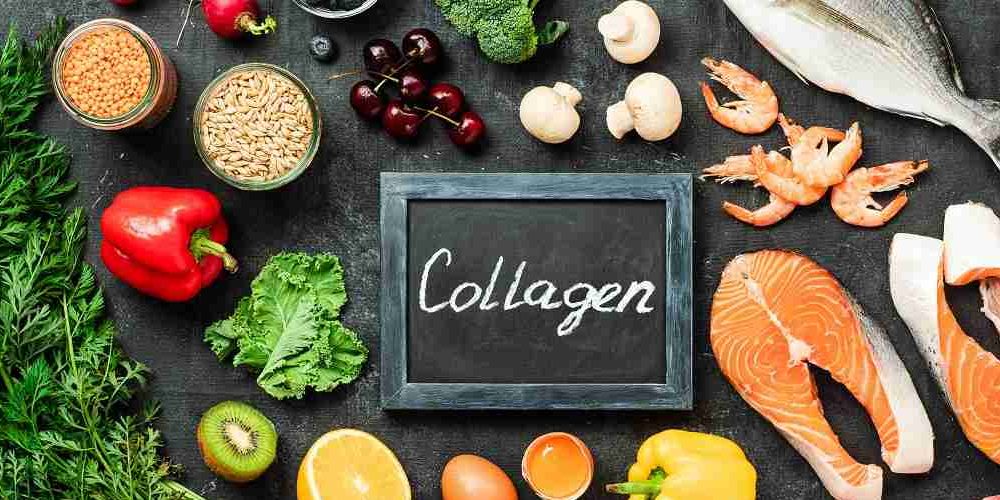Our health and wellbeing is inextricably tied to the food we eat. In addition to regular exercise, our diet is also one of the building blocks of a healthy lifestyle. It plays a great role in the appearance and youthfulness of our skin, hair and thereby the way we feel about ourselves. Collagen is a vital structural protein that plays a huge role in the maintenance of healthy skin, bones, muscles and tendons [1], and makes up about 30% of all proteins [2]. Collagen lends structural support to the connective tissues in our bodies, [3] and acts as a natural glue that provides strength, shape and firmness to our skin so it can maintain and repair itself.
Ageing is an inevitable part of our life. With age, our body’s collagen production decreases (amongst other things). This begins during our mid-20s and continues gradually thereafter. A decline in collagen production is primarily visible through the signs of skin ageing.
The good thing - the decline of collagen can be offset or reduced to a certain extent through our diet. Read on to learn about a set of foods that promote collagen production in the body, directly or indirectly.
Foods That Are Natural Sources of Collagen
a) Bone broth

Bone broth can be a great source of collagen when prepared properly. Making the broth usually includes simmering animal bones in water, herbs, and edible acid (to extract the collagen). An Indian version of bone broth is called paya.
The main issue with bone broth and other collagen-rich foods is that the size of collagen protein may not be digested in their original form and are broken down into amino acids like other proteins. That’s why they are considered an unreliable source of collagen peptides or the amino acids required for collagen production in the body [4].
b) Egg

Although eggs lack the connective tissues seen in many other animal products, egg whites do contain a collagen-like protein with high levels of proline, an amino acid required for collagen formation [5].
c) Chicken

Certain parts of chicken such as the head, neck and feet are rich in collagen [6]. However, it is difficult to extract collagen from these at home because they involve complex grinding and defatting processes. If chicken seems like a viable option to you, there are poultry collagen supplements available in the market for your convenience.
d) Fish

Fish is a great source of collagen and it may help promote collagen production. Interestingly, fish skin, scales and fins, which are usually considered as the waste products of fish processing, are exceptionally rich in collagen [7]. If fish seems like a viable option to you, there are marine collagen supplements available in the market for your convenience.
Foods That Contain Nutrients Known To Promote Collagen Production
a) Citrus and tropical fruits

Vitamin C is abundant in fruits such as grapes, oranges, kiwis, guavas, and limes, and is essential for collagen formation in the body [8]. Guava also includes some amount of zinc, which is a cofactor in the formation of collagen [9].
b) Green leafy vegetables

Vitamin C, zinc, and copper are all found in leafy green vegetables like kale and spinach, which promote collagen formation [10]. They also contain a high amount of chlorophyll, which is recognised for its antioxidant effects and a recent study also supports their ability to stimulate collagen formation [11].
c) Tomatoes

Tomatoes contain a red pigment known as lycopene, which is responsible for their deep-red colour. Other than being a strong antioxidant, this pigment may also promote collagen production (according to early research) [12].
d) Nuts and Seeds

Nuts and seeds like pumpkin seeds, cashews, almonds and sesame seeds are rich sources of zinc and copper that promote collagen synthesis in the body [13] [14].
e) Green tea

Catechins, an amazing antioxidant found in green tea, are known to promote collagen production [17] [18].
While these foods are definitely beneficial for our skin health and promote collagen production, supplementing with collagen peptides can be of great value too. These supplements can be sourced from multiple animal sources and you can choose the one that suits best for you:
Sources of Collagen Peptides Supplements

Collagen peptides supplements contain short chains of amino acids and are considered to be the best form of collagen intake. This is because peptides of two or three amino acids are absorbed intact by the body so they directly benefit and repair collagen-containing tissues in our body.
a) Marine or fish
As the name suggests, this type of collagen can be extracted from the fish meat, scales, fins and bones. While this is one of the more popular sources of collagen peptides, people who are allergic to fish should avoid taking marine collagen peptides [19].
b) Bovine
Bovine collagen peptides come from cows. The collagen is extracted specifically from their skin, bones, tendons and ligaments. They are equally beneficial as other collagen peptides sources, however, some may avoid bovine collagen due to cultural considerations [20].
c) Poultry
Poultry collagen is mainly extracted from the skin, tendons, bones and cartilage of chicken. This collagen peptides source may be the most well-accepted but it is also not ubiquitous in the market [21].
Conclusion
Collagen is an essential protein for the repair of body tissues and its intake can be increased by the above methods. If you are curious about what collagen is and how it functions, you can understand more about collagen here. After reading this, if you'd like to introduce collagen supplements into your diet, our marine sourced Nutrova Collagen Peptides + Antioxidants or Nutrova Collagen Peptides (highly pure poultry collagen) are great options.



